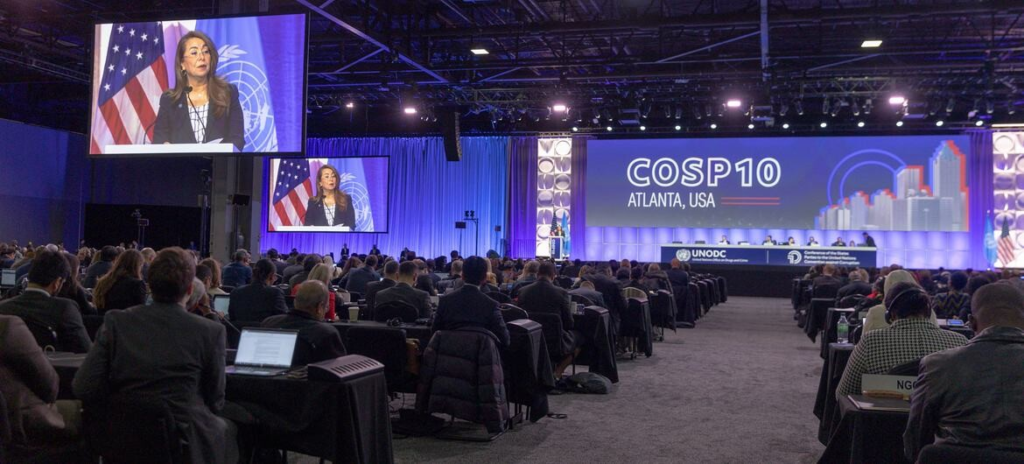
© UNIS Vienna UNODC Executive Director Ghada Waly (on screen) delivers remarks at CoSP10 in Atlanta, United States.
“The fight against corruption is everyone’s fight,” United Nations Office of Drugs and Crime executive director Ghada Waly told attendees at last week’s UN anti-corruption conference, and “anti-corruption bodies lead the way, alongside supreme audit institutions.”
Over 2,000 anti-corruption officials from around the world gathered in Atlanta for the tenth session of the biennial Conference of States Parties, or CoSP as the gathering is called, to celebrate global achievements in combating corruption. As the international community celebrated the 20th anniversary of the seminal UN Convention Against Corruption, attendees were reminded of the work that remains to bring transparency and accountability to reduce global corruption that is estimated to cost up to 25 percent of global GDP, or $3 trillion per year.
In recent years, anti-corruption experts have recognized the important perspective that auditors bring to the fight and have sought to elevate the role of auditors. Among the updates provided to attendees in Atlanta was the progress made in implementing the UN’s December 2019 “Abu Dhabi declaration.” This declaration called for enhancing collaboration between supreme audit institutions and anti-corruption bodies to more effectively prevent and fight corruption.
Despite an intervening disruptive global pandemic that diverted the attention of public auditors to pandemic-related oversight, modest progress has been made in implementing the Abu Dhabi declaration. The most notable progress has been the issuance of the UNODC’s 2022 “Enhancing Collaboration Between Supreme Audit Institutions and Anti-Corruption Bodies in Preventing and Fighting Corruption: A Practical Guide” and the issuance of the G20’s 2023 “Compendium of Good Practices in Enhancing the Role of Auditing in Tackling Corruption.”

The practical guide provides examples of how supreme audit institutions can be involved in the design of national anti-corruption strategies, how corruption risk assessments can inform the design of audits, and how auditors can provide forensic expertise to support investigations. The compendium provides examples of how to strengthen the role of auditors and strengthen cooperation between auditors and investigators. In Atlanta, several nations also reported on their efforts in helping to draft anti-corruption legislation and their on-going consultations with investigators.
Public auditors—with a professional focus and expertise in accountability, assurance, internal controls, and risk—can indeed play an important role in combating corruption, and supreme audit institutions are strategically positioned to identify systemic risks and make recommendations to strengthen internal controls to prevent and detect corruption. This capacity depends on the institution’s legal mandate and organizational competency. Competency comes not only from classroom training but from sharing best practices and studying the methodologies of others.
A growing body of anti-corruption related audit work can be found online. Audit reports relating to ethics and corruption from the European association of supreme audit institutions are available online on a dedicated ethics audit report webpage, and ethics and corruption related audit reports can be searched by keyword on the GAO website and the Council of IGs Oversight.gov website.